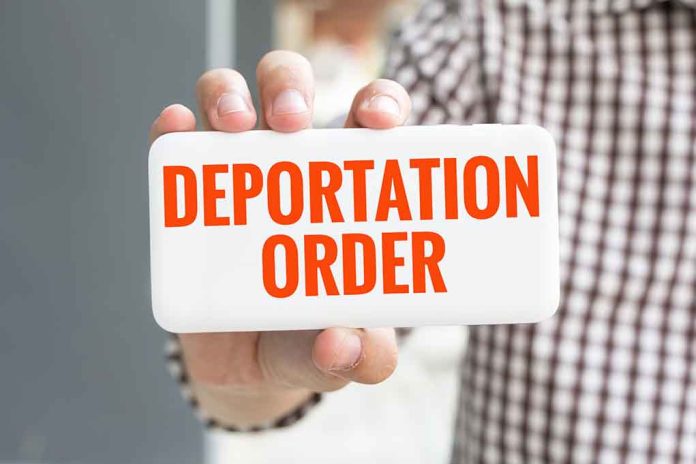
The Department of Homeland Security declared “Fire up the deportation planes” as President Trump’s administration launches aggressive new measures against illegal immigrants, bolstered by a major Supreme Court victory that allows deportations to third countries.
Key Takeaways
- The Trump administration has repurposed the CBP One app into “CBP Home” to encourage self-deportation with $1,000 “exit bonuses” and subsidized airfare.
- The Supreme Court has ruled in favor of the administration, allowing deportations to third countries without requiring migrants to demonstrate potential harm.
- DHS officials argue the policy targets dangerous criminals whose own countries won’t accept them, while critics claim it undermines due process rights.
- A $200 million ad campaign has been launched to promote self-deportation as the dignified option for illegal immigrants.
- The administration has implemented potential criminal penalties and fines for those who refuse to self-deport.
Supreme Court Victory Empowers Trump Administration
The U.S. Supreme Court delivered a significant win for President Trump’s immigration agenda by allowing the administration to resume deporting migrants to third countries without offering them opportunities to demonstrate potential harm. This ruling overturns a previous judicial order that required the government to provide migrants a “meaningful opportunity” to express risks of torture at their destination. The decision, opposed by the court’s liberal justices Sonia Sotomayor, Elena Kagan, and Ketanji Brown Jackson, represents a dramatic shift in deportation policy.
The Department of Homeland Security immediately celebrated the ruling with an unusually forceful statement that concluded with the phrase “Fire up the deportation planes.” This declaration signals the administration’s determination to remove illegal immigrants who have committed serious crimes but whose home countries refuse to accept their return. The policy targets individuals who have often been described by administration officials as perpetrators of “heinous crimes” and pose continuing threats to American communities.
Innovative Self-Deportation Program
In a parallel effort, the administration has repurposed a Biden-era application, transforming the CBP One app (originally designed to schedule legal entry appointments for asylum seekers) into “CBP Home,” which now facilitates self-deportation. The program offers significant incentives for illegal immigrants who voluntarily depart, including a $1,000 “exit bonus,” subsidized airfare, and temporary protection from ICE enforcement while they prepare to leave. This approach represents a carrot-and-stick strategy in the broader deportation effort.
“Do what’s right, leave now,” said Kristi Noem.
The administration has backed this initiative with a massive $200 million advertising campaign that promotes self-deportation as the dignified option for those in the country illegally. For those who resist the voluntary program, the administration has implemented fines and potential criminal penalties. The campaign message is clear and direct, with ads featuring statements like “If you are here illegally, you’re next,” creating a sense of inevitability about enforcement while offering a controlled exit path.
National Security vs. Humanitarian Concerns
DHS officials have defended their aggressive stance by highlighting the dangers posed by criminal aliens who previously remained in the United States due to legal technicalities. “The Supreme Court ruling is a victory for the safety and security of the American people,” stated DHS in its official release. The statement further criticized judicial activism that had previously hampered deportation efforts, arguing that such legal obstacles endangered American communities by allowing dangerous criminals to remain in the country.
“If these activists judges had their way, aliens who are uniquely barbaric that their own countries won’t take them back, including convicted murderers, child rapists and drug traffickers, would walk free on American streets,” stated DHS.
Critics, however, have raised serious concerns about the administration’s approach. Immigrant rights groups have filed a class action lawsuit challenging the rapid deportations to third countries without notice or opportunity to assert potential harms. Reports that the administration considered deporting migrants to Libya, despite its unstable conditions and previous US condemnation of its treatment of detainees, have intensified criticisms. These opponents argue that the self-deportation campaign is fundamentally dishonest and erodes trust in government institutions.




